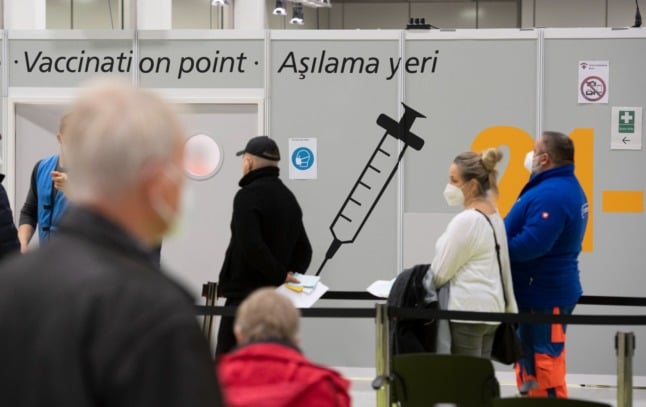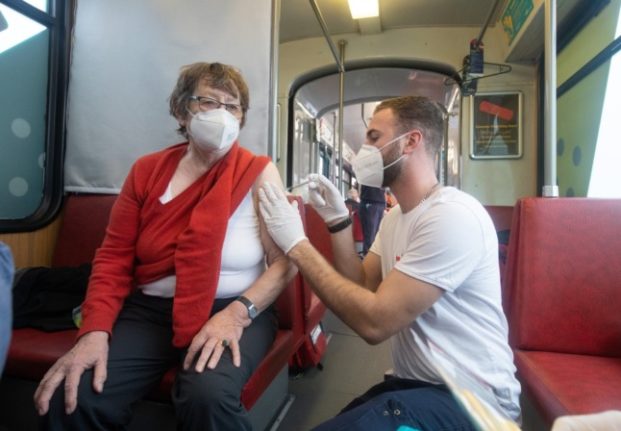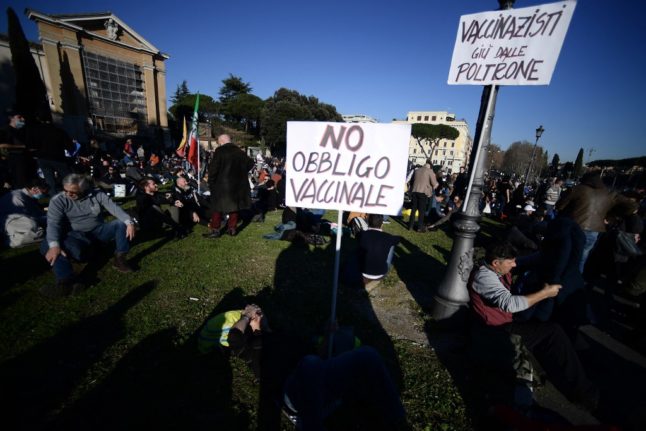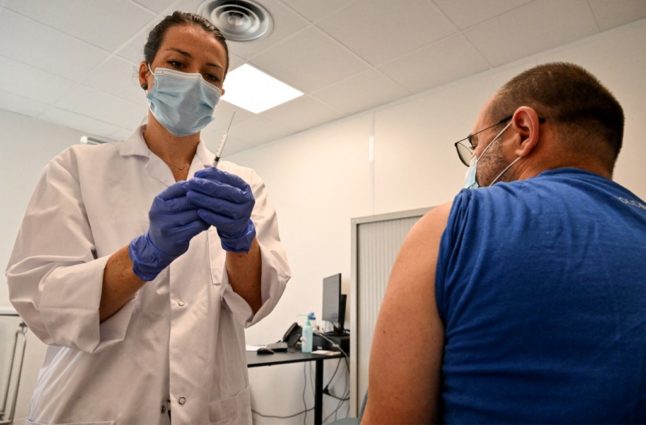Several countries in Europe and across the globe have begun to recommend and administer Covid booster shots to improve people’s immunity to the virus. Here’s a look at the situation in some other European countries.
Germany
Most German states began issuing booster shots in September with a focus on care home residents and staff, and the very elderly. At the moment, Germany’s standing vaccine commission (STIKO) generally recommends that all the over 70s, people in care, medical staff and those with pre-existing conditions should get a top-up mRNA Covid vaccine shot six months after their last dose.
People who’ve had the vector vaccine AstraZeneca are also advised to get a booster shot, while people who’ve had the single-shot vector vaccine Johnson & Johnson should get an mRNA top-up anytime four weeks after their jab.
However, the outgoing Health Minister Jens Spahn has said that everyone in Germany – regardless of whether they belong to a risk group – should be able to get a booster shot six months after their last dose. He is also calling on local districts and doctors to inform the over 60s about the offer.
On Friday state health ministers also backed the call.
“The federal states agree that everyone who had their second jab six months ago or longer should be able to get an appropriate booster,” Bavarian health minister Klaus Holetschek said.
READ ALSO:
- Germany seeing a ‘massive pandemic of the unvaccinated’
- German health ministers recommend Covid booster jabs for all
The government has been slammed for the confusing messaging and the lack of a concrete nationwide booster jab campaign.
Germany – along with other Switzerland and Austria – has struggled to increase its vaccination rate compared to other European countries, as the Our World in Data graph below shows.
Switzerland
Switzerland on October 26th announced that Covid booster shots would be administered from November 15th onwards.
Switzerland has come under fire for stalling on booster shots, which are already being administered in several other countries including the United States, Austria, Germany and Israel.
Covid-19: Why is Switzerland still stalling on booster shots?
From November 15th, people in high risk categories and those over the age of 65 are recommended for a booster shot to improve their immunity. Specific risk group info is available here.
In order to get a booster, you must have had your second shot at least six months ago.
Some people who are in very high risk categories have been getting booster shots in some Swiss cantons since August.
This was however only done on an ad hoc basis and not as part of a widespread campaign – and was not offered in all cantons.
Covid booster vaccinations in Switzerland: What you need to know
Booster shots in Switzerland will count towards the country’s Covid certificate, after the government backtracked on a previous decision that the booster shots should not be entered into the certificate.
The government said it was initially worried that people would only get booster jabs in order to extend their certificates.
As it stands, Covid certificates are valid for 12 months after the second shot, although the government has since indicated that this may be extended to 18 months in the future.
READ MORE: Are healthcare workers eligible for Covid booster jabs in Switzerland?
Austria
Everyone aged 12 and over is encouraged to get a third jab as of November 3rd, and can do so as long as at least six months have passed since their second dose. Those who have had the one-dose Johnson and Johnson vaccination are encouraged to get a booster with an MRNA vaccine at least 28 days after their shot.
Booster doses were rolled out to people in at-risk groups and aged over 65 starting from late August.
France
France began its booster shot programme in September, but currently it is only open to certain groups.
Those who had their last vaccine dose more than six months ago and are also either over 65, a healthcare worker or someone in a high risk group (ie those with serious medical conditions) are now eligible for a booster.
Around 2.5 million people – out of an eligible population of 6.8 million – have already had their third dose. Those who got Covid after being vaccinated do not require a booster, the French government has ruled.
On the issue of booster shots for all, France is still undecided. The medical regulator has previously spoken in favour of a widespread campaign of third shots, but is yet to deliver a formal opinion on the subject.
This is expected in the next few weeks, and it will then be up to the government, guided by the regulator’s opinion, to make the final decision.
A decision will also have to be made on whether to update the health pass to show booster shots.
At present vaccination is compulsory for health workers in France, but getting the booster is not, although they are encouraged to get it.
EXPLAINED: France’s Covid vaccine policy on third doses, the health pass and under 12s

Spain
So far, Spain’s Health Ministry has only approved the Covid-19 booster vaccine for over 65s, immunocompromised people and care home residents.
Spain’s Covid booster vaccine campaign officially launched nationwide on October 25th, although some regions started earlier, which explains why Spanish health workers have already managed to administer 1 million booster doses.
In the majority of regions, people eligible for the Covid booster shot are also being offered a flu shot on their other arm, with Spain’s Health Ministry encouraging vulnerable people to get both jabs to avoid the serious risk that contracting both influenza and Covid-19 can pose to them.
READ MORE:
- Getting a Covid-19 booster shot in Spain: Everything you need to know
- Getting the flu vaccine in Spain in 2021: What you need to know
So far, Pfizer and Moderna are the approved booster vaccines in Spain. These Messenger RNA inoculations will also be offered to people who received the single-dose Johnson and Johnson vaccine or the AstraZeneca vaccines.
On Tuesday November 2nd, Spain’s Health Ministry agreed to reduce by half the dose of those given a Moderna booster shot.
The country’s chief epidemiologist Fernando Simón has said he is against the idea of administering Covid-19 booster shots “in general” as “it seems that immunity lasts for years”, and opinion shared by other leading Spanish scientists who think it’s currently not necessary to offer a booster shot to younger adults.
READ MORE: Will Spain give a Covid booster shot to people of all ages?
Around 80 percent of Spain’s total population has been fully vaccinated against Covid-19, one of the highest inoculation rates in the world.
Norway
Norway began offering booster jabs to over 65’s in October. The third dose is offered six months after the second jab for people who have received the Moderna or Pfizer vaccines or after the same period after one jab of Johnson & Johnson’s single-dose Janssen vaccine.
An mRNA vaccine, either Moderna or Pfizer, will be given to those who have had a Johnson & Johnson jab.
The municipalities in Norway handle the rollout of booster jabs. The priority system for who gets a booster first is the same as the regular vaccine program, with the oldest and most vulnerable being prioritised.
On November 4th, it was announced that frontline healthcare workers would also be offered a third Covid-19 vaccine. Currently, it isn’t clear when the rollout for healthcare workers would begin. However, Norway’s health minister has said plans on how the rollout would work were being drawn up by the Norwegian Institute of Public Health and the municipalities.
According to the Norwegian Institute of Public Health, 91 percent of those over 18 have received one Covid-19 vaccine, and 86.6 percent are fully vaccinated.
Sweden
Sweden started offering the third Covid-19 dose to people with severely weakened immune system in early September, and has since opened it up to more groups.
At the time of writing, everyone over the age of 65 can get a free booster shot, as well as people who work in elderly care. Sweden is expected to roll it out to healthcare workers next, and then step by step to the rest of the population in winter and spring – the Public Health Agency has come under fire for not including healthcare workers at an earlier stage.
Sweden’s Public Health Agency recommends that the third dose should be one of the mRNA vaccines, regardless of which vaccine was administered as the first or second dose. This means that someone who has already had AstraZeneca’s Covid-19 vaccine Vaxzevria will get Pfizer/Biontech’s Comirnaty or half a dose of Moderna’s Spikevax.
Italy
Italy began offering a third dose of a Covid vaccine to patients with suppressed immune systems, as well as cancer patients and transplant recipients, in late September. This was soon extended to care home workers and health professionals, and then to all people aged over 60.
The Italian health minister has said it is “most likely” that the rest of the population will be offered a free booster shot from January 2022, though no plans have been officially confirmed.
Only the two mRNA vaccines currently approved for use in the EU – that’s the Pfizer Comirnaty vaccine and the Moderna Spikevax vaccine – will be used for the booster, according to the health ministry.
To date, almost 45 million people or 84 percent of the Italian population over the age of 12 are fully vaccinated, and 1.6 million have already received booster shots, health ministry data shows.




 Please whitelist us to continue reading.
Please whitelist us to continue reading.
Member comments